Love Song of the Dark Lord: Jayadeva's Gitagovinda
Select Format
Select Condition 
Book Overview
Jayadeva's dramatic lyrical poem Gitagovinda is one of the most important works in Indian literature and a source of religious inspiration in both medieval and contemporary Vaishnavism. Revealing an intense earthly passion to express the complexities of divine and human love, its songs are an important part of Indian devotional music and literature.
Format:Paperback
Language:English
ISBN:0231110979
ISBN13:9780231110976
Release Date:April 1997
Publisher:Columbia University Press
Length:254 Pages
Weight:0.53 lbs.
Dimensions:0.4" x 5.8" x 9.0"
Grade Range:Postsecondary and higher
Related Subjects
Ancient, Classical & Medieval Asian Education & Reference Hinduism History History & Criticism Humanities Inspirational & Religious Literary Literary Criticism & Collections Literature Literature & Fiction Movements & Periods Other Eastern Religions & Sacred Texts Poetry Religion & Spirituality Religious Studies Sanskrit World LiteratureCustomer Reviews
3 ratings
The Mutual Divine Love of Krishna and Radha is Beautiful and Enlightening
Published by Thriftbooks.com User , 17 years ago
"An emotional attraction towards a personal god began to be expressed in the early centuries of the Christian Era." Ency. Britannica on Line "Deliverence is not for me in renunciation. I feel the freedom in a thousand bonds of delight." Rabindranath Tagore, Gitanjali Bhakti Movement for the Love of God: Bhakti a devotional movement in in Medieval India ( & South Asian Hinduism), expressing the intense love and emotional attachment of the faithful to their personal god. Bhakti came to mean "devotional worship and sharing love," the Sanskrit verbal root bhaj, originally meant "to share, to apportion." Bhakti movement, integrates aspects of personal religious experience, social protest, and a variety of ritual modes around a notion of intimacy with one's deity that colours all aspects of human existence. Bhakti Proponents among Hindus, challenged Vedic sacrificial religion, gender inequity, caste boundaries, and dominant use of Sanskrit as sole religious language. While all of the principal divinities in Hinduism; Vishnu, Shiva, and Shakti, has their own devotional cults, the Bhakti movement most characteristically developed around Vishnu, principally in his two earthly incarnations as Rama and Krishna. The mystical way of bhakti, claimed by its supporters to be a superior way, has contrasted other ways of achieving salvation, by knowledge, ascetic body disciplines, and ritualistic/good works. It is as well open to all, irrespective of their class, gender, or caste into which they were born. Krishna's Sacred Love: An emotional attraction towards a personal god began to be expressed in the early centuries of the Christian Era. It was an attitude furthered by the Indian epics, "the Mahabharata and the Ramayana" and by the Puranas, sacred texts that recount legends of the various appearances of the deities, their incarnations and genealogies. The devotional practices accorded them included the recitation of God's name, the singing of hymns in praise of him, wearing his emblem, undertaking pilgrimages to sacred places serving him in many ways. Radha, in Hindu mythology, is the beloved consort of Krishna during his earthly life among the cowherds of Vrindavana. Radha, who was the wife of another cowherd was Krishna's unseparable companion. In the Bhakti devotional fellowship Radha, symbolizes the female human soul while Krishna, the divine male. Radha allegorical love has been given expression in lyrical poetry of most Indian languages, including the supremely lyrical Govinda Das. The Bengali god Chaitanya was deemed an incarnation of the unseparable lovers; Krishna on the inside and Radha on the outside. Chaitanya also composed many lost lyrics celebrating the divine love. The Gitagovinda by Jayadeva was a favourite source of inspiration for later miniature painters, in whose works Radha is seen waiting for Krishna to return with the cows in the twilight or engaged with him in amorous play in a forest grove. The images of Krishna playing the
Earth & Heaven
Published by Thriftbooks.com User , 19 years ago
Enjoy the work for what it is . . . an earthy and sensuous titillation of the senses in order to draw one's being to the heavenly consummation of spiritual attainment. It's just as disastrous to be unmoved by the lower passions as it is to be moved only by such illusions. ~Namaste
A very excellent work, but the tattva must be understood
Published by Thriftbooks.com User , 25 years ago
This is one of those works that may be taken out of context, due to a misunderstanding of tattva(principle or truth) and of siddhanta(conclusions). In the mind of a mundane reader, it may appear to be something like "erotic" poetry, like the gross, mundane activities between an ordinary man and woman. Therefore it is essential when reading this work that one has some understanding of the ontological position of Radha and Krishna. For this end, it is a necessity that one studies the work of His Divine Grace A.C. Bhaktivedanta Swami Prabhupada, specifically Srimad Bhagavatam and Bhagavad-gita. These works are given in parampara(disciplic succession)coming directly from Sri Krishna Himself. Therefore they are very authoritative in understanding the complex intricacies and knowledge of the Supreme Personality of Godhead and His diverse energies. If one does not have a philosophical understanding of Krishna, the Supreme Personality of Godhead, and has not removed all material contamination from the heart, such as lust, greed, envy, anger, illusion, madness and even subtle desires for profit, adoration and distinction, then reading the "Gita-Govinda" will be nothing short of disasterous. This is because one will mis-understand the loving exchages between Radha and Krishna to be something like mundane sex life. This is a most offensive and improper mentality. "Gita-Govinda" is not mere poetry, like that of some conditioned soul. It is written for liberated souls to relish. Therefore we should be very cautious when approaching this divine and sacred work.






